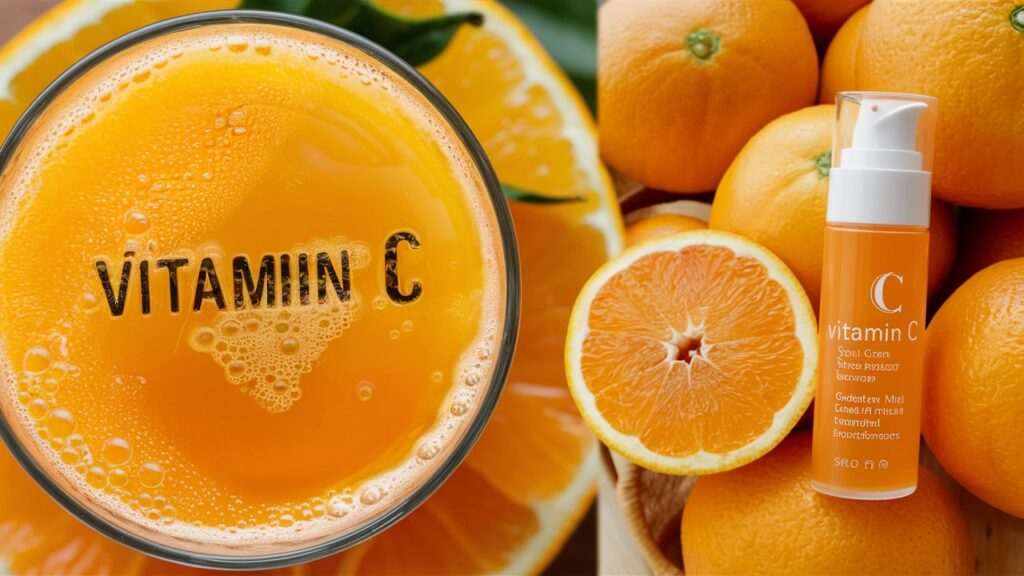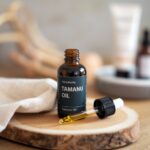- There is no direct scientific research specifically linking vitamin C to stretch mark prevention or reduction.
- Experts suggest that a diet rich in vitamin C may help prevent stretch marks by maintaining skin integrity.
- Topical vitamin C can potentially enhance collagen synthesis, which might reduce the visibility of stretch marks over time.
- Vitamin C may help improve skin texture and fade pigmentation in stretch marks due to its role in collagen production and melanin inhibition.
Stretch marks are a common concern for many people, often associated with rapid weight gain, pregnancy, or growth spurts during adolescence.
These streaks on the skin can be a source of discomfort or self-consciousness for some, leading them to explore various treatments and remedies. One such remedy that has gained attention is vitamin C, which is rich in ascorbic acid, a potent antioxidant that is vital in promoting collagen production and improving skin elasticity.
But what exactly is the relationship between vitamin C and stretch marks? Can this powerful vitamin help reduce or prevent stretch marks?
What science says
No direct scientific studies or research papers specifically examine the relationship between vitamin C oil and ascorbic acid stretch marks. The search results provide general information about vitamins and nutrients that may benefit skin health and reduce the appearance of stretch marks. However, the studies do not contain in-depth research on vitamin C oil.
The key relevant findings from the search results are:
- Vitamin C helps with collagen production, which keeps skin strong and elastic.
- Eating a balanced diet with a variety of colorful fruits and vegetables provides important vitamins and nutrients for skin health, like vitamin C. 1
- No high-quality research proves that oils like cocoa butter, olive oil, almond oil, vitamin E, or coconut oil effectively prevent stretch marks. However, some studies suggest they may keep skin hydrated and promote wound healing.
- Vitamin C and other antioxidant-rich foods like fatty fish, eggs, and dairy may help reduce the appearance of stretch marks, but more research is needed. source
More targeted research is needed to determine if vitamin C oil has unique benefits for stretch marks compared to other vitamins, minerals and nutrients that support skin elasticity and wound healing.
Natural Ingredients For Stretch Marks: Why They May Not Work
What dermatologists say
Dermatologists have varying opinions on vitamin C’s role in treating and preventing stretch marks. Here are insights from notable experts in the field:
Dr. Morgan Rabach
Dr. Morgan Rabach, a board-certified dermatologist, emphasizes the importance of vitamin C for skin health. She states, “Vitamin C helps in collagen production, which helps maintain skin elasticity. A vitamin C-rich diet can help prevent stretch marks by supporting the skin’s structural integrity”. https://www.byrdie.com/stretch-mark-treatments-4843512
Dr. Zein Obagi
Dr. Zein Obagi, another prominent dermatologist, recommends vitamin C serums as part of a skincare regimen to help improve skin appearance. He notes, “Using topical vitamin C can enhance collagen synthesis, which may reduce the visibility of stretch marks over time”. https://www.byrdie.com/stretch-mark-treatments-4843512
Overall, dermatologists agree that vitamin C can aid collagen production and improve skin elasticity, but it is not a standalone solution for treating existing stretch marks. Instead, it should be part of a broader approach that includes maintaining a healthy diet and considering other treatments, such as retinoids or laser therapy, for more significant results.
How Vitamin C Might Help with Stretch Marks
Given its role in collagen synthesis and skin repair, vitamin C may offer several benefits for stretch marks:
- Enhancing Collagen Production: Since stretch marks are caused by a breakdown of collagen and elastin, increasing collagen production could potentially improve their appearance. Vitamin C’s role in synthesizing collagen means that it may help strengthen the skin and reduce the prominence of stretch marks.
- Reducing Inflammation: Vitamin C has anti-inflammatory properties that can help reduce redness and inflammation associated with stretch marks.
- Improving Skin Texture: Regular use of vitamin C can help improve the skin’s texture. As it promotes collagen and elastin production, it may help to smooth out the uneven texture caused by stretch marks.
- Fading Pigmentation: Vitamin C’s ability to inhibit melanin production can help lighten hyperpigmented stretch marks, making them less noticeable.
Ways to Incorporate Vitamin C into Your Skincare Routine
There are several ways to include vitamin C in your skincare regimen to benefit stretch marks potentially:
-
- Topical Vitamin C Serums: These serums are designed to deliver a high concentration of vitamin C directly to the skin. Apply the serum to clean, dry skin, focusing on areas with stretch marks. Look for products that contain stable forms of vitamin C, such as ascorbic acid or ascorbyl palmitate.
- Vitamin C Creams and Lotions: Another option is to use creams or lotions containing vitamin C. These products are often formulated to provide longer-lasting hydration and can be applied all over the body, including areas prone to stretch marks.
- Dietary Vitamin C: Incorporating vitamin C-rich foods can support skin health. Fruits and vegetables like oranges, strawberries, kiwi, bell peppers, and broccoli are excellent sources of vitamin C. A well-balanced diet can enhance your skin’s ability to repair and regenerate.
- Vitamin C Supplements: Supplements can be an alternative to getting enough vitamin C from your diet. Consult a healthcare provider before starting new supplements, especially if you have underlying health conditions.
Considerations and Limitations
Vitamin C’s effectiveness in reducing stretch marks can vary from person to person. Factors such as the severity of the stretch marks, skin type, and overall health can influence the results.
Vitamin C may be more effective when combined with other treatments. For instance, combining vitamin C with retinoids or hyaluronic acid can enhance overall skin repair and improve the appearance of stretch marks.
Achieving noticeable results with vitamin C requires consistent use over time. Stretch marks do not disappear overnight, and improvements may take several weeks or months of regular application.
Conclusion
Vitamin C plays a significant role in maintaining healthy skin and has potential benefits for managing stretch marks. Its involvement in collagen synthesis, skin repair, and antioxidant protection makes it a valuable addition to skincare routines aimed at reducing the appearance of stretch marks. While vitamin C alone may not eliminate stretch marks entirely, it can improve skin texture, reduce pigmentation, and support overall skin health.

I’m a devoted organic skincare enthusiast, passionate about the natural, wholesome goodness that organic products bring to our skin.
Organic skincare isn’t just a hobby for me—it’s a lifestyle. Every product I use, recommend, and write about has been carefully chosen for its purity and effectiveness. Everything I write about is backed by scientific studies, dermatologists’ opinions, and user experiences.
I also excel at tackling skincare challenges with innovative, organic solutions.


